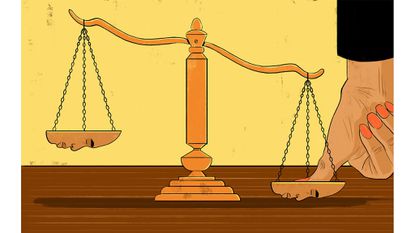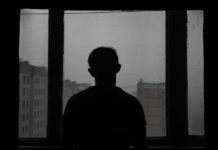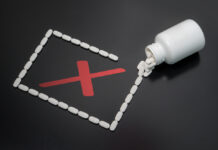Employees of several companies that conduct clinical trials for the pharmaceutical industry have just published a paper to test a tool intended to reduce the placebo effect in drug trials. It’s called the Placebo-Control Reminder Script (PCRS), and it was created by and licensed to several drug companies.
Their study’s goal was to demonstrate that the PCRS, when used in a clinical trial, can make the active drug look better by diminishing the improvement that people naturally experience in the placebo arm of the trial.
Elan A. Cohen led the study at the Hassman Research Institute (HRI). It included other employees of HRI as well as employees of APEX Innovative Services, Collaborative Neuroscience Network (CNN), and VeraSci. The owner of VeraSci is also a listed author. All of these firms are funded by the pharmaceutical industry to conduct clinical trials. The study was published in Neuropsychopharmacology.
Cohen et al. write that “The remarkably high and growing placebo response rates in clinical trials for CNS indications, such as depression and schizophrenia, constitute a major challenge for the drug development enterprise.”
 Some researchers suggest that the strong placebo effect is a good thing, which could be harnessed to enable improvement without an active drug’s adverse effects. For instance, Beth Israel Deaconess Medical Center and Harvard Medical School have set up a Program in Placebo Studies & Therapeutic Encounter (PiPS) that aims to enhance the placebo effect.
Some researchers suggest that the strong placebo effect is a good thing, which could be harnessed to enable improvement without an active drug’s adverse effects. For instance, Beth Israel Deaconess Medical Center and Harvard Medical School have set up a Program in Placebo Studies & Therapeutic Encounter (PiPS) that aims to enhance the placebo effect.
Nonetheless, the placebo effect is quite troubling to the pharmaceutical industry, as their drugs have to be better than placebo (literally, better than nothing) to be approved for use—and they often struggle to meet that mark.
According to Cohen et al., “Drug development programs continue to face dauntingly low success rates in late phase randomized placebo-controlled trials (RCTs).”
The placebo effect—including natural improvement over time as well as an improvement due to expectations—is quite powerful when it comes to diagnoses like depression and schizophrenia. According to the authors, up to 50% of people taking a placebo find their depression improves, while for schizophrenia, that number is 41%.
In clinical trials of drugs intended to treat these disorders, the active drug is often no better or slightly better than the placebo. When unpublished trials are included, only half (51%) of antidepressant studies find that the drug is better than the placebo. Researchers have suggested, in fact, that any supposed antidepressant effect of SSRIs may be entirely due to the placebo effect.
There are several reasons for having a placebo-controlled study. First, the placebo group can indicate how many people would have improved anyway, even if they did not take the drug. This can include natural improvement over time and regression to the mean (in which the most severe cases improve significantly more). Second, the placebo group can indicate the effects of expectation—that is, people believe they are taking an active drug and so improve because they believe they will improve.
But while these reasons are helpful to the consumer, they are dangerous to the pharmaceutical industry since they make the active drug look less appealing. After all, if the same number of people improve on the drug or off it, then why should the consumer take the drug?
Cohen and the other consultants believe the PCRS can solve this problem.
The PCRS consists of a paragraph about the placebo effect that is first read aloud to the participant; then, the participant must repeat back the information to ensure they understand. The “information” includes advising the participant that they should not expect to feel better, that they should not expect the drug to work, and that they should know that they are in the placebo group if they experience no side effects. For instance: “Remember that the placebo is inactive and should do nothing to help your symptoms and should cause no side effects.”
In essence, the PCRS is a technical and purposeful way to break the blinding of a study—to ensure that the participants know whether they are receiving the active drug or not.
Researchers already argue that accidentally breaking the blind of a study is a severe problem that biases the study drug’s results. As Irving Kirsch writes in a peer-reviewed paper about antidepressant ineffectiveness, “The difference in improvement between drug and placebo is not clinically meaningful and may be due to breaking blind by both patients and clinicians.”
It is unclear how it could be considered ethical to purposefully create this bias in a clinical trial.
To test their hypothesis that the PCRS could stymie the placebo effect, Cohen et al. conducted a two-week single-blind trial. Single-blind means that the participants didn’t know which group they were in, but the researchers did. (Since the researchers could be biased in single-blind trials, double-blind trials are considered more likely to provide less-biased information.)
The consultants included 137 participants, all of whom met the criteria for current depression of at least moderate severity but no suicidal thoughts. Some had formal depression diagnoses, while others had diagnoses of schizophrenia or schizophreniform disorder.
The participants were told that they were in a clinical trial for a new antidepressant and that they would be split into two groups—one receiving the drug and one receiving the placebo. However, in reality, both groups received the placebo. The actual difference was that one group was also given the PCRS, while the other group was not.
Both groups improved over time, consistent with the natural course of “depression” and with the placebo effect. However, in line with Cohen et al.’s expectations, the group that received the PCRS showed less improvement than the group that didn’t receive the PCRS.
In the group that received the PCRS, 29.7% believed they had improved; in the group without the PCRS, 52.4% believed they had improved.
Average BDI scores dropped from about 30 to about 25 in the group that received the PCRS. However, in the “true placebo” group who did not receive the PCRS, average BDI scores dropped to below 20—meaning that they no longer even met the criteria for moderate depression.
That is, the “true placebo” group improved enough to no longer meet the criteria for depression severity that got them into the study in the first place. But those in the PCRS group improved only about half as much and still had moderate depression according to the BDI. So, the PCRS works as intended—it helps stop people from getting better on their own.
Cohen and the other consultants write that their results demonstrate that the PCRS is a useful tool for the pharmaceutical industry’s development of new drugs for psychiatric conditions.
“Briefly educating participants about placebo response factors can help mitigate the large placebo response rates that are increasingly seen in failed CNS drug development programs,” they write.
“By enhancing signal detection, such procedures may help drug developers progress compounds to faster approval and reach patients who are suffering sooner.”
****
Cohen, E. A., Hassman, H. H., Ereshefsky, L., Walling, D. P., Grindell, V. M., Keefe, R. S. E., . . . & Horan, W. P. (2021). Placebo response mitigation with a participant-focused psychoeducational procedure: a randomized, single-blind, all placebo study in major depressive and psychotic disorders. Neuropsychopharmacology, 46, 844–850. https://doi.org/10.1038/s41386-020-00911-5 (Link)















.
Report comment
If the drugs are no better than the “placebos” it must mean that they’re not worth anything – mustn’t it?
..especially the Psychiatric Drugs.
Report comment
Hopefully the FDA will not accept this devious attempt to break the blinding of a study. But who knows. The FDA has not always acted in the public’s best interests. Also, since it’s been found that people can improve even when they know they’re taking a placebo, this ploy may not work as well as the pharmaceutical industry would like. The study also has serious limits. It was a single blind, very small trial and, according to the researchers, there was no independent monitor reviewing sites’ work. So there may have been “inaccuracies” to hype the results.
Report comment
This is pretty stunning — or maybe not, considering the size of the profits threatened. These statements speak volumes:
“…The placebo effect is quite troubling to the pharmaceutical industry, as their drugs have to be better than placebo (literally, better than nothing) to be approved for use—and they often struggle to meet that mark.”
and
“It is unclear how it could be considered ethical to purposefully create … bias in a clinical trial.”
So, literally, here is a new tool to help researchers fake their results. Kind of reminds me of the argument a lawyer recently used about why voter-suppression laws should be allowed, to the effect of “without voter suppression, we could not win elections.”
Report comment
It is not UNCLEAR how it could be considered ethical. IT IS NOT ETHICAL, and should not ever be considered to be ethical. These people KNOW they are being unethical, or else they have no sense of ethics to offend. Why not call this out for what it is?
Report comment
OK, glad you and MS are on that!
Report comment
Of course trying to break the blinding of a study is unethical. But I question whether these researchers are also duping the pharmaceutical industry. As I said in a previous post people can improve even when they know they’re taking a placebo. In addition, this study was small and flawed and it’s not clear, to me that the FDA would permit this ploy, at least I hope not.
Report comment
Are we surprised? What it DOES do is expose them even more.
Report comment
The comment that the “placebo effect is quite troubling to the pharmaceutical industry” says it all. They intuitively know the placebo effect will “statistically” show that their drugs are useless and their profits “go up in smoke.” If I were in the pharmaceutical industry, I would be worried, too. I would worry a lot, because what does it reflect? That the pharmaceutical industry is doing wrong from the outset. They are just another group of “snake oil salesmen” with shiny pitches, shiny things, shiny money, etc. that mean nothing, but that nothing is more dangerous and damages more people daily than all the poisonous snakes on the planet Earth. Thank you.
Report comment
You’re thinking snakes today, I’m thinking scorpions — actually we shouldn’t be insulting either by comparing them to psychiatry.
Report comment
Oldhead -Well, I don’t like snakes nor scorpions. I did spend time in the Desert Southwest. When I moved there, I was in Junior High and my sister was a few grades behind me. His first and most important order to us as to our move was: “Don’t look under the rocks. There might be snakes or scorpions.” Huh. What alleged profession continuously hides under rocks? Aa-ah! And what is your final answer? Psychiatry, etc. and the Entire Associated Mental Health/Illness Industry. These are only metaphors, but snake bites and scorpion bites hurt and even kill! Has my case been made? Thank you.
Report comment
Not quite. With snakes and scorpions you’d be going to THEIR house, and all creatures are going to defend themselves as a basic law of Life. They don’t try to lure you into their nests, unless you’re a bug or something. Once you know where they live it’s a matter of basic respect to stay away, just like you’d stay away from a stranger toting a shotgun. We don’t always have that option with psychiatry. To play with the analogy a little.
Report comment
The problem with taking these kinds of “studies” seriously is that they perpetuate the falsehood that there is any kind of science involved in treating thoughts and feelings as diseases and disorders.
Report comment
Reducing the placebo effect is anti-scientific. Drug companies hate the placebo effect because it shows up their drugs as mostly active placeboes. Keeps them from selling as much!
Report comment
Shut up. It’s SCIENCE! 🙁
Report comment
Oh, sorry, I forgot!
Report comment
It’s not “SCIENCE,” oldhead. It’s psychiatry, which is PSEUDO SCIENCE.
Report comment
I think he was being facetious!
Report comment
“Researchers have suggested, in fact, that any supposed antidepressant effect of SSRIs may be entirely due to the placebo effect.”
Marvelous Peter. Great info. What is of great interest is how far they have to go in order to try selling their drugs. And it again proves that suggestions given to people have an effect of great significance.
And it is one of the reasons that shrinks have no success. To suggest to someone that they suffer from something horrible, an incurable illness, will indeed make people depressed. The drugs that follow just further prove to the ‘patient’ that they are ‘sick’. Works perfect for shrinks and the industry. Make sure people have nowhere else to turn, then sell them the lies.
It benefits government to because it gives people jobs in the “health industry”
Report comment
And many “mental health” workers hubrisly proclaimed, they knew nothing about the common adverse and withdrawal effects of the antidepressants, until 2005.
https://www.cambridge.org/core/journals/psychiatric-bulletin/article/brain-shivers-from-chat-room-to-clinic/642FBBAE131EAB792E474F02A4B2CCC0
Maybe those hubris controlled “mental health” workers, who knew next to nothing about the common adverse effects of the drugs they forced onto innocent others. Thus misdiagnosed innocent people, should wake the f-ck up, and start utilizing their malpractice insurance for what it is intended.
Report comment
The Placebo Effect. It was big deal in my psych classes in college and high school. Of course, now they are all in denial. But, then they also use these placebo trials in non-psychiatric drug trials. That is, I think, part of how they determine if a drug works or the possible and probable side effects of the drug are. They do this all the time. They also test on particular animals. But, is all this really and truly ethical, and moral? Is this really in line with Universal Law or God’s Law? Could that apple or fruit (depending on the translation) that the serpent tempted Eve with and then tempted Adam and subsequently got them kicked out of the Garden of Eden forever be a “drug” at least by modern standards? This is just a goofy question. Thank you.
Report comment
I think it might have been some Magic Mushrooms — things get lost in translation. 🙂
Report comment